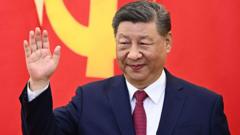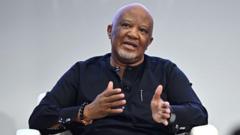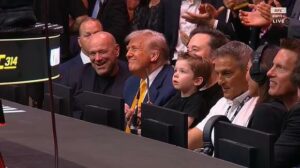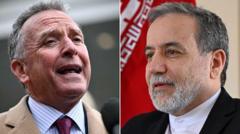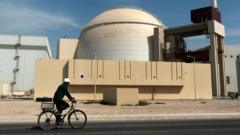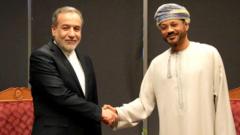With the US and Iran’s positions on nuclear capability seemingly irreconcilable, the fear of regional conflict looms large.
**US-Iran Nuclear Talks: The Divide Grows Deeper Amid Ambitions and Threats**
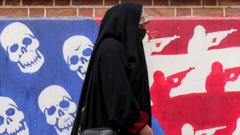
**US-Iran Nuclear Talks: The Divide Grows Deeper Amid Ambitions and Threats**
Tensions escalate as landmark negotiations approach without clear consensus on nuclear policies.
In the latest development ahead of pivotal nuclear talks, the United States and Iran remain entrenched in their respective positions, signaling a potential impasse. President Donald Trump, amid ongoing geopolitical challenges, has reignited focus on Iran, seeking a resolution to what he terms unfinished business from his previous administration. The president's accelerated diplomatic agenda is juxtaposed with a backdrop of skepticism over Iran's nuclear intentions. While Tehran maintains it is not pursuing nuclear weapons, international observers express concern that the Islamic Republic aims for the capability to assemble a nuclear arsenal, raising fears of an arms race in an already volatile Middle East.
The original 2015 nuclear agreement, the Joint Comprehensive Plan of Action (JCPOA), has since unraveled following Trump’s withdrawal in 2018, which he justified by accusing Iran of sponsoring terrorism through proxy groups like Hamas and Hezbollah. The reimposition of stringent sanctions has exacerbated tensions, with Iran ramping up uranium enrichment activities, now dangerously nearing weapon-grade levels according to the International Atomic Energy Agency (IAEA).
Trump's administration has simultaneously sought to exert maximum pressure and engage diplomatically. Following an imposing memorandum aimed at enforcing sanctions, the US president extended an invitation for negotiations to Iranian Supreme Leader Ali Khamenei, seeking a resolution within a two-month window. Talks are tentatively set for this weekend in Oman, where the US is prepared to deliver a stark ultimatum: secure an agreement or face potential military action.
Tehran's response remains multifaceted, with some factions supportive of a renewed deal to alleviate economic strife, while others view current circumstances as an impetus to pursue nuclear armament. Iran faces considerable economic hardships, including rampant inflation and a depreciating currency, which may compel some engagement. However, any negotiations would likely touch on sensitive topics, particularly in dismantling its nuclear program extensively—a red line for Iranian hardliners.
The negotiating landscape is complicated further by external factors, including Israel's insistence on an outright termination of Iran's nuclear ambitions and its willingness to consider military options if diplomacy fails. Israeli Prime Minister Benjamin Netanyahu has likened potential outcomes to Libya’s disarmament in 2003, a comparison Iran is unlikely to embrace.
The prospect of unsuccessful negotiations casts a shadow over subsequent moves by both nations. Israel, equipped with modern military capabilities, contemplates potential strikes on Iran’s fortified nuclear sites; however, such operations would necessitate intelligence and operational support from the US, increasing the risk of a broader conflict that neither Trump nor regional players might desire.
As the clock ticks on diplomatic efforts, Trump continues to explore a resolution amidst rising tensions. With historical negotiations taking years to reach fruition, the urgency placed on parties for a swift deal raises questions about the viability and sincerity of potential solutions. The ensuing weeks will be crucial in determining whether diplomacy can defuse one of the most pressing security dilemmas facing the region.



